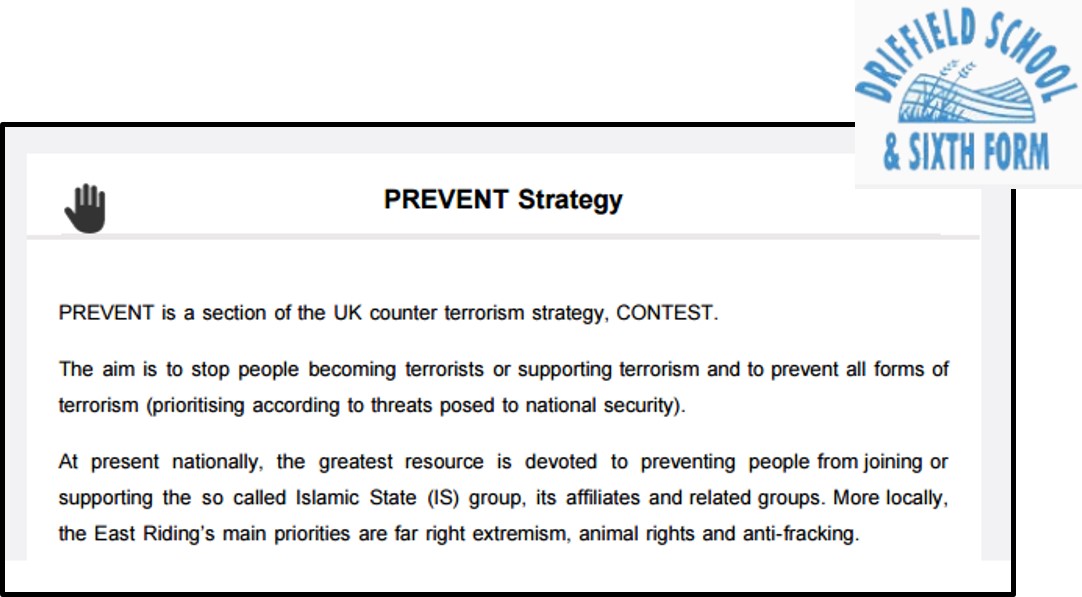Controversial links made by the police between anti-fracking campaigners and domestic extremism are coming under scrutiny and challenge. Ruth Hayhurst of DrillOrDrop investigates.
In the past month, a policing monitoring group, a peer and two opponents of shale gas operations have called for greater care and openness in the use of the Government’s counter-terrorism strategy, Prevent.
Over the past year, evidence has emerged of connections made by police between anti-fracking campaigns and radicalisation.
Examples include:
- A presentation to pupils at Driffield School and Sixth Form in East Yorkshire which linked anti-fracking protesters and extremists.
- Last year, the Times Educational Supplement reported that police training on the Prevent for teachers in West Yorkshire included references to environmental activists and anti-fracking protesters.
- Individual anti-fracking campaigners have complained about being referred by education staff to the Channel programme, part of Prevent, designed (in the Government’s words) to offer advice and support to people identified as at risk of being drawn into terrorism.
These complaints prompted Netpol, an organisation which monitors protest policing, to ask five police forces in north west England for details about Channel.
It used Freedom of Information laws to request the number of people who had been referred to Channel because they were regarded as at risk from radicalisation in anti-fracking campaigns.
All five forces refused and last week Netpol revealed that its appeal to the Information Commissioner, the regulator on information legislation, had been refused. Netpol is currently considering whether to appeal further to the First-Tier Information Rights Tribunal.
In its response, the Information Commissioner’s Office (ICO) said: “Channel may be appropriate for anyone who is vulnerable to being drawn into any form of terrorism.”
It added: “It follows from this that, for a referral to be made to Channel, it must be suspected that an individual is at risk of becoming involved in terrorist related activity.”
The ICO accepted the argument made by the police forces that confirming any information would disclose that Preventofficers were targeting anti-fracking events for extremist activities.
“Prevent is a national counter-terrorism initiative that is only implemented in certain police forces across the country. The same FOI request made to multiple forces could therefore identify how Prevent resources are apportioned across the country.
“It is the Commissioner’s view that the disclosure of information that would take place by merely confirming or denying would be useful intelligence to anyone wishing to circumvent counter terrorism arrangements surrounding fracking and would be potentially damaging to the UK’s national security.”
‘Rubber-Stamping Unfounded Link’
Netpol described the ICO’s decision as “extraordinary” and accused it of “rubber-stamping an unfounded link between anti-fracking and extremism”. It said:
“What is missing from any of these statements is a simple but fundamental fact – there is simply no evidence whatsoever of any link between anti-fracking campaigns and extremism, never mind a risk of ‘terrorism-related activity’”.
Netpol said: “In effect, the Commissioner is insisting nobody is referred unless there is a good reason for doing so – even if this is for nothing more than expressing legitimate political opinions about fracking.
“There is no reason for Prevent officers to target anti-fracking events for extremist activities and no reason for a police presence at anti-fracking events “as a Prevent priority”.
Netpol added: “There is an urgent need for greater transparency about the false conflation of opposition to fracking – and increasingly other campaigns – with terrorism and a threat to national security”.
In response to Netpol’s comments, the Green Party peer, Baroness Jones of Moulsecoomb, raised the issue in parliament.
She put these questions to the Home Office:
- How many regional Counter Terrorism Units have been involved in monitoring anti-fracking protests?
- How many arrests for a serious crime have been made by each unit as a result of such monitoring activity?
- What guidance has the government given to the police about the use of covert infiltration of anti-fracking groups?
- What guidance has the government given to the police about the exchange of information between the police and representatives of the coal and gas industry?
- Does Prevent training includes reference to participation in anti-fracking groups?
‘No Information’
The response, given in written answers last Thursday (24/11/2016), was full of negatives. The Home Office minister, Baroness Williams of Trafford, replied: “The Government does not hold information on the monitoring by police Counter-Terrorism Units of anti-fracking activity, or the number of arrests made by each Unit associated with any such activity.”
“The Government has not given specific guidance to the police on the use of undercover officers in anti-fracking groups. This is an operational matter. However, the police use of undercover officers and other covert sources is regulated by Part 2 of the Regulation of Investigatory Powers Act 2000 (RIPA) and subject to guidance in the Covert Human Intelligence Sources Code of Practice published under section 71 of RIPA.”
“Prevent training does not include any reference to participation in anti-fracking groups.”
“The Government has not issued guidance to the police regarding exchanges of information between the police and the coal and gas industry. The National Police Chiefs Council has issued guidance to forces on policing linked to onshore oil and gas operations.”
Evidence from Prevent Workshops
Baroness Williams’ reply on training materials appears to contradict evidence of references to anti-fracking protests during Prevent workshops.
In a recording, sent to Netpol, a police officer specifically refers to anti-fracking campaigners at a Prevent training workshop for public sector staff. He is heard saying: “Domestic: animal rights and anti-fracking got anyone [inaudible] got anyone know of Frack Off? Sometimes it does. Why are they on there? Well, if they demonstrate in accordance with the Public Order Act then there’s absolutely no problems.”
The officer then mentioned unproven allegations: “What has happened though recently is at anti-fracking at Barton Moss, down in West Sussex and in Surrey, had some exploratory sites, people there started assaulting the workers going in … damaging equipment, trying to damage the site where the exploratory is taking place and all that sort of stuff. While people are with the placards at the front gate, absolutely no issues but once you cross the line into violence for their cause, then it becomes extreme. And it becomes violent extremism. As long as people stay within the law, no problem.”
Audio recording (transcribed section is about 2 minutes after the start)
A history teacher at the training day reported by the Times Educational Supplement said the officer referred to the arrest of the Green Party MP, Caroline Lucas, at anti-fracking protests at Balcombe in August 2013.
The teacher, Dylan Murphy, said: “The thing that set alarm bells ringing in my head was when he started talking about environmental activists.
“I thought, ‘Are you equating anti-fracking protests and environmental protesters with neo-Nazis and terrorists?’”
Anti-Fracking Protests – ‘Local Priority’
More recently, pupils at a school in East Yorkshire had a presentation about Prevent which included a slide of anti-fracking protesters.
Extract from Driffield School and Sixth Form newsletter
The Driffield School and Sixth Form newsletter for parents reported on Prevent priorities:
“At present nationally, the greatest resource is devoted to preventing people from joining or supporting the so called Islamic State (IS) group, its affiliates and related groups. More locally, the East Riding’s main priorities are far right extremism, animal rights and anti-fracking.”
This specific link prompted Michael Farman, from Beverley to challenge a senior officer at East Riding Yorkshire Council.
Mr Farman wrote to Mike Furbank, the head of Children and Young People, Education and Schools: “Anti-fracking and animal rights protesters are categorised as ‘extremists’ with wording implying that they are equivalent to terrorist organisations such as ISIS.
“So are the police suggesting to our local children that the thousands of people in East Yorkshire who are prepared to demonstrate to protect our countryside are a potential risk to society?
“This misinformation amounts to indoctrination, an activity that should never be practiced in our democratic society.”
‘Blurring the distinction’
Mr Farman added: “I am sure that you are aware of the danger of blurring the distinction between the occasional unlawful conduct of a few protesters (usually limited to trespass, obstruction of the highway and occasional verbal abuse of the police), and true extremists who are prepared to use violence, and that you recognise the need for our children to be clearly aware that such a distinction exists.
“They already have so many threatening issues and problems to deal with; they must not be given the false impression that they are surrounded by even more threats than are truly present.”
Mr Farman urged officials to engage with police to remove what he calls “offensive and dangerously misleading material” from Prevent presentations.
Mr Furbank replied that the materials used in the presentation were what he called “generic support materials provided through the Prevent strategy at a national level”.
He continued: “I agree that the message needs to be nuanced but the act of “grooming” that is implicit in the process which ‘radicalises’ a young person and potentially leads them into a place of significant harm can be informed or driven by a number of different frameworks of belief- in effect it is the intention of the ‘radicaliser’ and the impact on the young person that is the issue, not necessarily the beliefs that are used as a vehicle to exert control over the young person.”
Mr Farman described this part of the reply as disturbing: “While seemingly sympathetic and concerned, he concedes that anything the Police care to define as ‘radicalism’ may be seen as malevolently influencing a child’s mind. But this is exactly what the Prevent strategy is attempting to do by linking anti-fracking and animal rights activists with terrorist organisations in the minds of schoolchildren.”
‘Alarming links’
Another East Yorkshire resident has described the application of Prevent in the county as “alarming”.
Jon Mager, also from Beverley, accused Humberside Police of using “the training of head teachers to promote their own views on radicalisation of young people by identifying far-right extremists, animal rights campaigners and anti-fracking campaigners as their main priorities in training teachers to identify school children at risk of radicalisation.”
Mr Mager, a former Director of Children’s Services in East Yorkshire and opponent of fracking, asked the council in a Freedom of Information request to identify schools in the county which had:
- Delivered Prevent training for staff
- Provided teaching activity to pupils based on Prevent training
- Held assemblies with content on Prevent training
He also asked for details of governor training in the strategy.
The council should reply to Mr Mager by 19 December 2016. DrillOrDrop will report on its response.
This article has been cross-posted from DrillOrDrop.
Photo via DrillOrDrop
Subscribe to our newsletter
Stay up to date with DeSmog news and alerts








